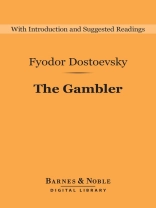This edition includes a modern introduction and a list of suggested further reading.
Perhaps better than any other work of fiction, Dostoevsky’s novel The Gambler captures and analyzes gaming’s fatal attraction. We follow Aleksey Ivanovich’s ups and downs in the make-believe German city of Roulettenburg, where nationalities mix in a frenzied competition for money and status. Written in twenty-six days to beat an unscrupulous publisher’s deadline, The Gambler is based on the author’s own struggles with gambling addiction. It will leave readers amused and baffled at Aleksey’s contradictory and self-destructive energy.
About the author
Fyodor Mikhailovich Dostoevsky, one of the world’s greatest novelists, was born in 1821 in Moscow. Dostoevsky started his writing career in the 1840s as a member of the literary school of Sentimental Naturalism, which took as its subject the urban poor. His very first publication, Poor Folk (1846), a novel in letters between a lowly government clerk and an orphan seamstress was an enormous success that established him as a leading young author in Petersburg. Despite bad health throughout his life, and a variety of calamities, his output as a writer was prodigious. He produced five major novels in fifteen years—Crime and Punishment (1866), The Idiot (1868), The Demons (1871), The Adolescent (1875), and The Brothers Karamazov (1880). He died in 1881 by then generally recognized as one of Russia’s greatest writers.











![Cover of Jennifer Richards: Elizabeth Singer [Rowe] Cover of Jennifer Richards: Elizabeth Singer [Rowe]](https://static.worldofdigitals.com/thumb_webp/931/9781351940931.webp)
